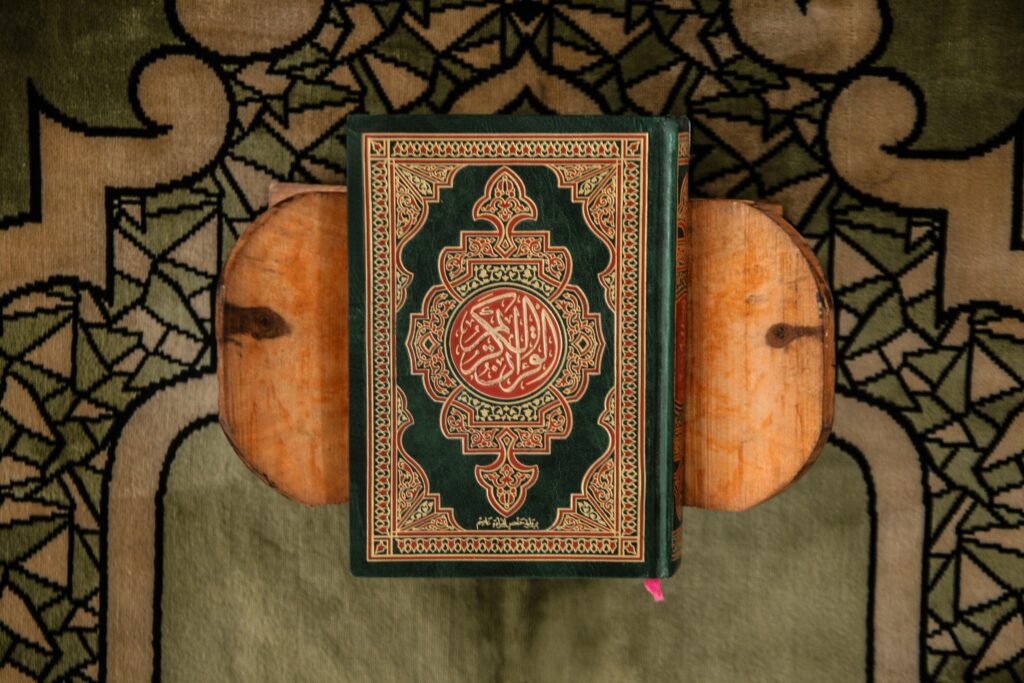Jalees Ahmad, Al Hakam

In this brief article, we shall look at the verse of Surah an-Naml, specifically the story of Prophet Mosesas describing the moment when he encountered the burning bush on Mount Sinai. According to Islamic tradition, this is the moment when Allah spoke to Mosesas for the first time.
The story is also mentioned in other parts of the Quran, particularly in Surah Taha and Surah al-Qasas. Mosesas was travelling with his family when he saw a fire in the distance. When he approached the fire, he heard a voice coming from the direction of the fire, and this was Allah speaking to him:
“So when he came to it, he was called [by a voice]: ‘Blessed is he who is in the fire and [also] those around it; and glorified be Allah, the Lord of the worlds.” (An-Naml, Ch.27: V.9)
The meaning of this verse will be explored in light of Hazrat Musleh-e-Maud’sra tafsir, and a frequently asked question will be addressed: Was God in the bush?
Understanding the presence in the fire in light of the Quran and Torah
When Prophet Mosesas reached the place where he witnessed the vision, he was inspired with the words: “‘Blessed is he who is in the fire and [also] those around it’” (An-Naml, Ch.27: V.9) This means that the one who is in the fire is blessed, and those who are around it are also blessed.
Hazrat Musleh-e-Maudra has stated that some commentators have interpreted this to mean that the presence of God was within that fire (Tafsir-e-Kabir [2023], Volume 10, pp.45-47). This idea is also presented in the Torah. In the book of Exodus, Chapter 3, it is written:
“And the angel of the LORD appeared unto him in a flame of fire out of the midst of a bush: and he looked, and, behold, the bush burned with fire, and the bush was not consumed. And Moses said, I will now turn aside, and see this great sight, why the bush is not burnt. And when the LORD saw that he turned aside to see, God called unto him out of the midst of the bush, and said, Moses, Moses. And he said, Here am I. And he said, Draw not nigh hither: put off thy shoes from off thy feet, for the place whereon thou standest is holy ground.” (Exodus, 3:2-5)
However, the Holy Quran does not accept this idea. It states that the revelation given to Mosesas was: “‘Blessed is he who is in the fire and [also] those around it’” (An-Naml, Ch.27: V.9) This means that the one in the fire is blessed, and the surroundings are also blessed. However, God Himself blesses others; no one else bestows blessings upon Him. Thus, it can be said that He is the source of blessings, but not “blessed” in the same way as others.
Clarifying the proper use of ‘Blessed’ in reference to God in the Quran

It is incorrect, as some Quranic commentators have done, to apply the expression بورِكَ مَن فِي النَّارِ to God. The term بورِكَ (blessed), is not appropriate to use in reference to God. The correct term to describe the Almighty is تَبارَكَ, which means “He is the source of all blessings.” And thus, the Quran even states:
تَبٰرَکَ اللّٰہُ رَبُّ الۡعٰلَمِیۡنَ
“Blessed is Allah, the Lord of the worlds.” (Surah al-A`raf, Ch.7: V.55)
فَتَبٰرَکَ اللّٰہُ اَحۡسَنُ الۡخٰلِقِیۡنَ
“So blessed be Allah, the Best of creators.” (Surah Al-Mu’minun, Ch.23: V.15)
The spiritual interpretation of ‘fire’
Hazrat Musleh-e-Maudra has also explained that it is not appropriate to use the word “burika” (بُوْرِکَ) for Allah Almighty because blessings are not bestowed upon Him; rather, He Himself grants blessings. Interpreting “fi” (فِیْ) to mean “behind” – as some have suggested – and understanding the verse as referring to the person who is coming from behind the fire or searching for it as the one who is blessed goes against linguistics.
There is no doubt that “fi” can sometimes mean “behind,” but this meaning is only used when referring to something spiritual or abstract. It is not used when referring to physical objects or persons.
To also interpret “in” to mean “near” and suggest that “in the fire” means “near the fire” and use the phrase “whoever is around it” as evidence, cannot be accepted as the words “whoever is around it” themselves contradict this interpretation, because “around it” also means “near,” and there would be no need to express the same concept with two different words. Therefore, this interpretation is also incorrect.
These interpretations are incorrect and stem from a misunderstanding of the word “fire” (نار). Since most interpret “fire” as physical fire, they become entangled in these difficulties (Tafsir-e-Kabir [2023], Volume 10, pp.45-47). However, the word “fire” in this context does not refer to material fire but to spiritual fire. When the fire is understood to be a spiritual fire, meaning the fire of divine love, the verse becomes clear in meaning. In visions or dreams, seeing fire always symbolises the passion of divine love. Therefore, the word “blessed” does not and cannot refer to God, because He is not corporeal, nor does anyone bless Him. Nor does “whoever is in the fire” refer to Mosesas. Rather, this verse presents a general divine law that anyone who burns in the fire of divine love is blessed. This interpretation resolves any disputes about the meanings of “in” (فِي), “whoever” (مَنْ), or the phrase “blessed” (بُورِكَ), and the verse becomes fully clear in meaning.
This means that not only is the person who is immersed in the fire of divine love blessed, but those who are in his company also receive blessings. In all the languages of the world, love is often compared to fire, and in dreams and visions, if someone sees themselves burning in fire, it is interpreted to mean that they will attain the station of divine love.
Thus, the phrase “‘Blessed is he who is in the fire and [also] those around it’” means that the person who is within this fire will be blessed, and even the one who does not enter it but stands near it, taking a lesser share of it, will also be blessed. If “who is in the fire” referred to Mosesas, then the question would arise as to who “and [also] those around it” refers to. At that time, besides Mosesas, who else was near the fire to whom this phrase could apply? Therefore, this verse does not point to any specific person but rather establishes a general principle: whoever enters this fire will be blessed, and whoever comes close to it and feels its warmth will also be blessed. The past tense in this context is used with a future meaning, indicating that blessings will be given.
The Promised Messiahas has also explained this very matter. He states:
“Please notice that God clearly states in this verse that blessed is he who is in the fire, and those who are around it, and God Almighty called out to bestow this blessing upon them. From this, we learn that the thing that was in the fire was what received the blessings, not the one who gave the blessings. God uses the word َ نُوۡدِی [nudiya—called out] to indicate that He Himself blessed the inside of the fire and its surroundings. From this, it is proven that God was not in the fire and this is not the belief of Muslims either.” (The Holy War [English], pp. 38-39)
The verse continues with “and glorified be Allah, the Lord of the worlds.” (An-Naml, Ch.27: V.9) This indicates that the Lord of all the worlds is free from all defects.
Those who say that God was in the fire, as the people of the Bible claim, are mistaken. God is free and exalted above any physical embodiment. By saying “and glorified be Allah, the Lord of the worlds.” (An-Naml, Ch.27: V.9) it is also implied that when God bestows blessings upon someone, His purity and freedom from defects are manifested through that person. All the flaws that people attribute to God are removed, and the beautiful face of God is once again revealed to the world in all its glory.
(This article draws extensively from Tafsir-e-Kabir [2023], Volume 10, pp. 45-47)

